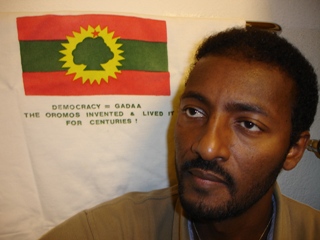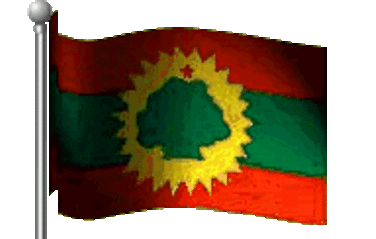Ethiopia's 'own Darfur' as villagers flee government-backed violence
By Steve Bloomfield in Bosasso
Early one June morning, in Kamuda, a village of 200 families in the remote Ogaden region in eastern Ethiopia, 180 soldiers announced their arrival by firing guns in the air.
The village, they said, had been providing food and shelter for the Ogaden National Liberation Front (ONLF), a separatist rebel group . As the villagers froze in horror, the soldiers plucked out seven young women, all aged between 15 and 18, and left.
The following morning the youngest girl was found. Her body, bloodied and beaten, was hanging from a tree. The next day a second girl was found hanging from the same tree. A third suffered the same fate. The others were never seen again.
Shukri Abdullahi Mohammed, 48, a mother of seven children, lived in Kamuda. As she describes the fate of the seven girls – "the most beautiful girls in the village" – she tightens her headscarf around her neck to indicate the way they were killed. "I will not forget it," she says.
Days later, a 12-year-old boy from the same village was kidnapped by soldiers and gang-raped. Every night, soldiers would knock on doors looking for women to rape. "I did not want to wait until it happened to my family," said Mrs Mohammed. They left Kamuda and made their way across the porous border with Somalia, before travelling a further 300 miles by foot to the hot and humid port town of Bosasso.
About 100 Ethiopians are now arriving here every day. Their stories reveal the brutality of Ethiopia's hidden war, a brutal counter-insurgency that some aid officials believe has parallels with Darfur. Some estimates put the number of people displaced by the violence at 200,000 already.
According to accounts from refugees, Ethiopian troops are burning villages, raping women and killing civilians as part of a systematic campaign to drive them from their homes. They reported dozens of villages destroyed and accused the Ethiopian government of forcibly starving its own people by preventing food convoys reaching villages and destroying crops and livestock.
A former Ethiopian soldier who defected from the army said how he had been ordered to burn villages and kill all their inhabitants. He said the Ethiopian air force would bomb a village before a unit of ground troops followed, firing indiscriminately at civilians. "Men, women, children – we killed them all," he said.
"We were told we were fighting guerrillas – the ONLF," he said. "But we were killing farmers – they were not ONLF."
Those who managed to escape are living in a series of ramshackle refugee camps on the edge of Bosasso. Their shelters are made from pieces of cardboard and old rags, scraps of plastic sheeting and rusting corrugated iron.
Sat outside the shelters, on the grey expanse of dust and stone, voices overlap as refugees list the villages that have been destroyed. Kor u Celista, Gallaalshe, Fooldeex, Yoocaalle – places that were all once home to hundreds of families, now abandoned and empty, the huts burnt to the ground.
Abudllahi Shukri Mohammed, 30, a cattle herder from Dega Bur province tells how he was forced at gunpoint to work as a porter for a group of 300 soldiers. They took his 18 cows and made him and five other nomads carry heavy loads. After three long days marching through the Ogaden, Mr Mohammed tried to escape.
"They caught me and started beating me. They kicked me in the head and hit me with the back of their guns." With his right arm he motions the steady, repetitive smack of the guns against his body. His left arm lies limp on his lap. He has been unable to move it since the attack, his fingers fixed in an ugly formation.
"They beat me for two hours," he says, "then I fell unconscious. They thought I was dead so they left me."
Ethiopia claims it is defending itself against an insurgency launched by the ONLF in a region that has long been marginalised.
It claims villagers have been giving the fighters shelter and food. Analysts say Ethiopia has been attempting to reduce that support by emptying the countryside. Thousands have been moved to towns heavily controlled by the military. Anyone left in the villages is considered a possible ONLF supporter.
The Ethiopian military is not the only destructive force in the region. The ONLF launched its most daring assault in April. The group attacked a Chinese oil installation in Abole, killing nine Chinese and 65 Ethiopians.
It was that attack which sparked the fresh counter-insurgency – a fierce scorched-earth policy. In the Ogaden's main towns, Jijiga and Gode, the prisons are overflowing. "They are arresting anyone who they think might have a connection with the ONLF," says one human rights worker in Bosasso. "Some are being killed if the security forces don't believe they are telling the truth."
Human rights investigators are gathering evidence of widespread use of rape, with women reporting gang-rapes by up to a dozen soldiers. In some villages, men have been abducted at night, their bodies dumped in the village the next morning.
While in Darfur, aid agencies have been able to establish camps and provide humanitarian support, they have been blocked from setting up operations in the Ogaden. The International Committee of the Red Cross has been thrown out and Medicins Sans Frontieres has also been prevented from working. Journalists trying to enter have also been banned – those that have tried have been promptly arrested.
Source: news.independent.co.uk



0 Comments:
Post a Comment
<< Home